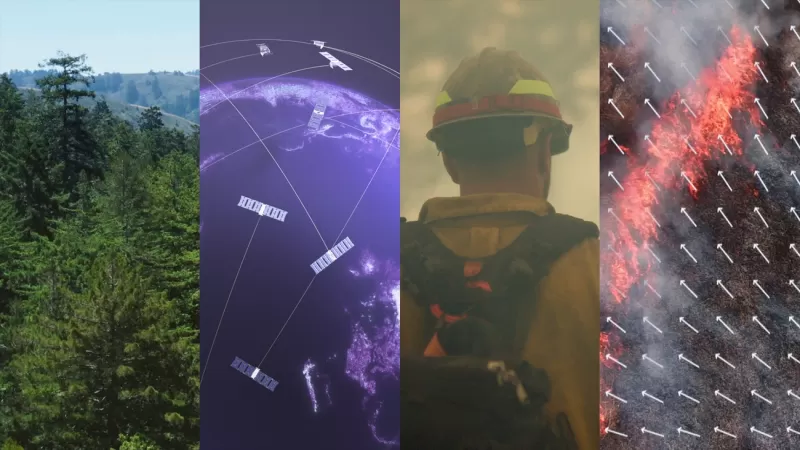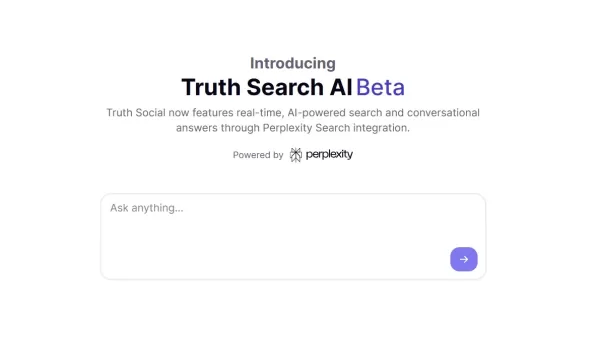A breakthrough in wildfire detection: How a new constellation of satellites can detect smaller wildfires earlier

Wildfires are on the rise, fueled by increasingly hot and dry conditions across the globe. Traditionally, firefighters have been limited to using satellite imagery that's either low in resolution or updated sporadically, often only a few times a day. This delay means fires can grow to the size of a soccer field before they're even detected.
In a groundbreaking move, Google Research has joined forces with fire management experts to develop FireSat, a specialized satellite constellation aimed at spotting wildfires as tiny as a classroom (about 5x5 meters). With FireSat, authorities will gain access to high-resolution images updated every 20 minutes worldwide, enabling them to tackle fires before they escalate into major threats.
To get this project off the ground, Google.org has committed $13 million to the Earth Fire Alliance, the nonprofit spearheading the FireSat initiative, with further backing from the Moore Foundation.
A constellation of satellites that can detect smaller wildfires with better frequency
To revolutionize wildfire detection, the Google Research team, in collaboration with Muon Space and the Environmental Defense Fund, developed custom infrared sensors for the satellites. These sensors are designed to pick up on small-scale fires. FireSat leverages AI to quickly compare any 5x5 meter area on Earth with past images, factoring in nearby infrastructure and local weather conditions to identify fires. To refine our detection model for smaller fires and create a baseline dataset for the AI, we conducted test flights over controlled burns. Muon Space is set to launch the first satellite in early 2025, with the complete constellation to follow in subsequent years.
Once operational, FireSat will deliver near real-time data on the location, size, and intensity of early-stage wildfires, allowing firefighters and emergency services to act swiftly and effectively. Beyond immediate response, FireSat's data will contribute to a global historical record of fire spread, aiding Google and scientists in enhancing our understanding and modeling of wildfire behavior. This initiative builds on our ongoing collaboration with the U.S. Forest Service on fire simulation.
FireSat is designed specifically to detect and track wildfires when they’re as small as a classroom.
Our commitment to researching wildfires
---------------------------------------
This initiative marks the latest in Google Research's ongoing efforts to assist communities worldwide in mitigating the effects of climate change. Since 2020, we've employed AI models to generate alerts and features that provide vital information to those near wildfires, with wildfire boundary tracking now available in over 20 countries. Earlier this year, we launched FireBench, an open-source ML benchmark dataset for wildfire research.
As we continue to enhance our wildfire detection capabilities, data and AI are crucial in delivering essential information to emergency responders and unlocking new research opportunities for scientists. We remain committed to collaborating with the fire community as we confront the escalating challenge of wildfires.
Related article
 "Exploring AI Safety & Ethics: Insights from Databricks and ElevenLabs Experts"
As generative AI becomes increasingly affordable and widespread, ethical considerations and security measures have taken center stage. ElevenLabs' AI Safety Lead Artemis Seaford and Databricks co-creator Ion Stoica participated in an insightful dia
"Exploring AI Safety & Ethics: Insights from Databricks and ElevenLabs Experts"
As generative AI becomes increasingly affordable and widespread, ethical considerations and security measures have taken center stage. ElevenLabs' AI Safety Lead Artemis Seaford and Databricks co-creator Ion Stoica participated in an insightful dia
 Truth Social’s New AI Search Engine Heavily Favors Fox News in Results
Trump's social media platform introduces an AI-powered search function with apparent conservative media slantExclusive AI Search Feature LaunchesTruth Social, the social media platform founded by Donald Trump, has rolled out its new artificial intell
Truth Social’s New AI Search Engine Heavily Favors Fox News in Results
Trump's social media platform introduces an AI-powered search function with apparent conservative media slantExclusive AI Search Feature LaunchesTruth Social, the social media platform founded by Donald Trump, has rolled out its new artificial intell
 ChatGPT Adds Google Drive and Dropbox Integration for File Access
ChatGPT Enhances Productivity with New Enterprise Features
OpenAI has unveiled two powerful new capabilities transforming ChatGPT into a comprehensive business productivity tool: automated meeting documentation and seamless cloud storage integration
Comments (25)
0/200
ChatGPT Adds Google Drive and Dropbox Integration for File Access
ChatGPT Enhances Productivity with New Enterprise Features
OpenAI has unveiled two powerful new capabilities transforming ChatGPT into a comprehensive business productivity tool: automated meeting documentation and seamless cloud storage integration
Comments (25)
0/200
![ChristopherAllen]() ChristopherAllen
ChristopherAllen
 April 14, 2025 at 8:08:52 AM EDT
April 14, 2025 at 8:08:52 AM EDT
¡Este nuevo sistema de satélites para detectar incendios forestales es un salvavidas! Detecta los incendios tan temprano, es como tener un superhéroe vigilando nuestros bosques. La única desventaja es que aún no está disponible en todas partes. ¡Espero con ansias la cobertura global! 🌍


 0
0
![ThomasLewis]() ThomasLewis
ThomasLewis
 April 13, 2025 at 11:08:01 PM EDT
April 13, 2025 at 11:08:01 PM EDT
この新しい衛星システム、森林火災の早期発見に革命をもたらしてくれました!本当に早く火災を察知してくれるので、まるで森を守るスーパーヒーローのようです。ただ、全世界で利用できないのが残念です。早く全世界で使えるようになるのを待っています!🌍


 0
0
![BenHernández]() BenHernández
BenHernández
 April 13, 2025 at 2:00:40 PM EDT
April 13, 2025 at 2:00:40 PM EDT
This new satellite system for detecting wildfires is a lifesaver! It catches fires so early, it's like having a superhero watching over our forests. The only downside is it's not available everywhere yet. Can't wait for global coverage! 🚀


 0
0
![HarryLewis]() HarryLewis
HarryLewis
 April 13, 2025 at 3:30:45 AM EDT
April 13, 2025 at 3:30:45 AM EDT
이 새로운 위성 기술은 산불 조기 발견에 혁신을 가져왔어요! 작은 불도 훨씬 일찍 발견할 수 있다니 정말 대단해요. 다만, 가격이 좀 비싸서 소규모 커뮤니티에겐 부담일 수 있겠네요. 그래도 조기 발견에는 필수죠?


 0
0
![MatthewGonzalez]() MatthewGonzalez
MatthewGonzalez
 April 12, 2025 at 4:44:40 AM EDT
April 12, 2025 at 4:44:40 AM EDT
Essa nova tecnologia de satélite para detecção de incêndios florestais é um salva-vidas! 🔥🌍 É incrível como podemos detectar esses incêndios muito mais cedo agora. Só uma reclamação: às vezes os alertas chegam tarde da noite. Mesmo assim, é um grande avanço em relação ao sistema antigo. Continuem melhorando!


 0
0
![RalphMitchell]() RalphMitchell
RalphMitchell
 April 12, 2025 at 4:39:58 AM EDT
April 12, 2025 at 4:39:58 AM EDT
この新しい衛星技術は、野火の早期発見に革命をもたらしました!🌍🔥 ただ、夜遅くにアラートが来ることがあるのが少し不満です。それでも、以前のシステムから大きな進歩です。これからも改良を続けてくださいね!


 0
0

Wildfires are on the rise, fueled by increasingly hot and dry conditions across the globe. Traditionally, firefighters have been limited to using satellite imagery that's either low in resolution or updated sporadically, often only a few times a day. This delay means fires can grow to the size of a soccer field before they're even detected.
In a groundbreaking move, Google Research has joined forces with fire management experts to develop FireSat, a specialized satellite constellation aimed at spotting wildfires as tiny as a classroom (about 5x5 meters). With FireSat, authorities will gain access to high-resolution images updated every 20 minutes worldwide, enabling them to tackle fires before they escalate into major threats.
To get this project off the ground, Google.org has committed $13 million to the Earth Fire Alliance, the nonprofit spearheading the FireSat initiative, with further backing from the Moore Foundation.
A constellation of satellites that can detect smaller wildfires with better frequency
To revolutionize wildfire detection, the Google Research team, in collaboration with Muon Space and the Environmental Defense Fund, developed custom infrared sensors for the satellites. These sensors are designed to pick up on small-scale fires. FireSat leverages AI to quickly compare any 5x5 meter area on Earth with past images, factoring in nearby infrastructure and local weather conditions to identify fires. To refine our detection model for smaller fires and create a baseline dataset for the AI, we conducted test flights over controlled burns. Muon Space is set to launch the first satellite in early 2025, with the complete constellation to follow in subsequent years.
Once operational, FireSat will deliver near real-time data on the location, size, and intensity of early-stage wildfires, allowing firefighters and emergency services to act swiftly and effectively. Beyond immediate response, FireSat's data will contribute to a global historical record of fire spread, aiding Google and scientists in enhancing our understanding and modeling of wildfire behavior. This initiative builds on our ongoing collaboration with the U.S. Forest Service on fire simulation.
This initiative marks the latest in Google Research's ongoing efforts to assist communities worldwide in mitigating the effects of climate change. Since 2020, we've employed AI models to generate alerts and features that provide vital information to those near wildfires, with wildfire boundary tracking now available in over 20 countries. Earlier this year, we launched FireBench, an open-source ML benchmark dataset for wildfire research.
As we continue to enhance our wildfire detection capabilities, data and AI are crucial in delivering essential information to emergency responders and unlocking new research opportunities for scientists. We remain committed to collaborating with the fire community as we confront the escalating challenge of wildfires.
 "Exploring AI Safety & Ethics: Insights from Databricks and ElevenLabs Experts"
As generative AI becomes increasingly affordable and widespread, ethical considerations and security measures have taken center stage. ElevenLabs' AI Safety Lead Artemis Seaford and Databricks co-creator Ion Stoica participated in an insightful dia
"Exploring AI Safety & Ethics: Insights from Databricks and ElevenLabs Experts"
As generative AI becomes increasingly affordable and widespread, ethical considerations and security measures have taken center stage. ElevenLabs' AI Safety Lead Artemis Seaford and Databricks co-creator Ion Stoica participated in an insightful dia
 Truth Social’s New AI Search Engine Heavily Favors Fox News in Results
Trump's social media platform introduces an AI-powered search function with apparent conservative media slantExclusive AI Search Feature LaunchesTruth Social, the social media platform founded by Donald Trump, has rolled out its new artificial intell
Truth Social’s New AI Search Engine Heavily Favors Fox News in Results
Trump's social media platform introduces an AI-powered search function with apparent conservative media slantExclusive AI Search Feature LaunchesTruth Social, the social media platform founded by Donald Trump, has rolled out its new artificial intell
 ChatGPT Adds Google Drive and Dropbox Integration for File Access
ChatGPT Enhances Productivity with New Enterprise Features
OpenAI has unveiled two powerful new capabilities transforming ChatGPT into a comprehensive business productivity tool: automated meeting documentation and seamless cloud storage integration
ChatGPT Adds Google Drive and Dropbox Integration for File Access
ChatGPT Enhances Productivity with New Enterprise Features
OpenAI has unveiled two powerful new capabilities transforming ChatGPT into a comprehensive business productivity tool: automated meeting documentation and seamless cloud storage integration
 April 14, 2025 at 8:08:52 AM EDT
April 14, 2025 at 8:08:52 AM EDT
¡Este nuevo sistema de satélites para detectar incendios forestales es un salvavidas! Detecta los incendios tan temprano, es como tener un superhéroe vigilando nuestros bosques. La única desventaja es que aún no está disponible en todas partes. ¡Espero con ansias la cobertura global! 🌍


 0
0
 April 13, 2025 at 11:08:01 PM EDT
April 13, 2025 at 11:08:01 PM EDT
この新しい衛星システム、森林火災の早期発見に革命をもたらしてくれました!本当に早く火災を察知してくれるので、まるで森を守るスーパーヒーローのようです。ただ、全世界で利用できないのが残念です。早く全世界で使えるようになるのを待っています!🌍


 0
0
 April 13, 2025 at 2:00:40 PM EDT
April 13, 2025 at 2:00:40 PM EDT
This new satellite system for detecting wildfires is a lifesaver! It catches fires so early, it's like having a superhero watching over our forests. The only downside is it's not available everywhere yet. Can't wait for global coverage! 🚀


 0
0
 April 13, 2025 at 3:30:45 AM EDT
April 13, 2025 at 3:30:45 AM EDT
이 새로운 위성 기술은 산불 조기 발견에 혁신을 가져왔어요! 작은 불도 훨씬 일찍 발견할 수 있다니 정말 대단해요. 다만, 가격이 좀 비싸서 소규모 커뮤니티에겐 부담일 수 있겠네요. 그래도 조기 발견에는 필수죠?


 0
0
 April 12, 2025 at 4:44:40 AM EDT
April 12, 2025 at 4:44:40 AM EDT
Essa nova tecnologia de satélite para detecção de incêndios florestais é um salva-vidas! 🔥🌍 É incrível como podemos detectar esses incêndios muito mais cedo agora. Só uma reclamação: às vezes os alertas chegam tarde da noite. Mesmo assim, é um grande avanço em relação ao sistema antigo. Continuem melhorando!


 0
0
 April 12, 2025 at 4:39:58 AM EDT
April 12, 2025 at 4:39:58 AM EDT
この新しい衛星技術は、野火の早期発見に革命をもたらしました!🌍🔥 ただ、夜遅くにアラートが来ることがあるのが少し不満です。それでも、以前のシステムから大きな進歩です。これからも改良を続けてくださいね!


 0
0





























